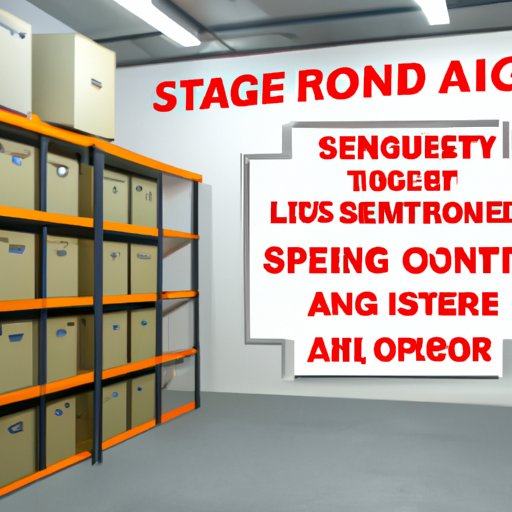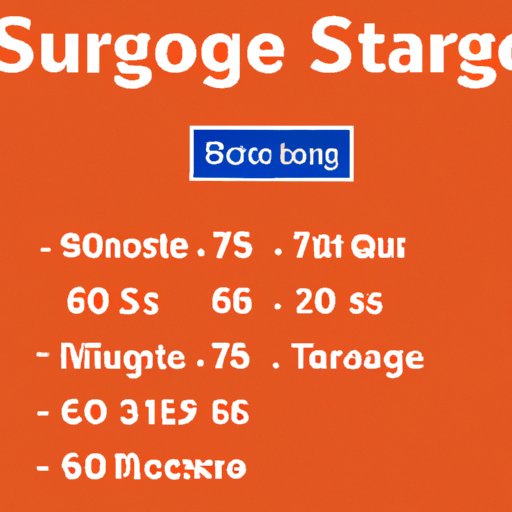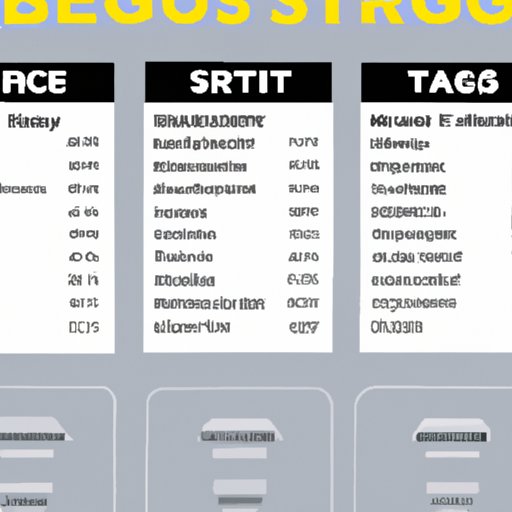Introduction
Renting a storage unit can be a great way to free up space in your home or business. But before you sign on the dotted line, it’s important to understand how much it will cost. In this article, we’ll explore the costs associated with renting a storage unit. We’ll look at average prices, regional differences, different types of pricing structures, common fees, and hidden costs. Tips for getting the best deal are also included.
Cost Comparison: What are the Average Prices to Rent a Storage Unit?
The cost of renting a storage unit varies depending on a number of factors. Location is one of the most important. According to Sparefoot’s 2018 National Self-Storage Price Index, the national average cost for a 10×10 storage unit is $118 per month. However, prices can vary significantly from region to region. For example, the average cost for a 10×10 in the West is $144 per month, while the average cost in the Midwest is only $85 per month.
It’s also important to compare storage unit costs to other storage options. According to Consumer Reports, a full-service storage company can cost up to three times as much as a self-storage unit. For example, a 5×5 storage unit with a full-service storage company can cost around $125 per month, while a 5×5 storage unit with a self-storage facility can cost as little as $30 per month.
Renting a Storage Unit: What You Need to Know About Prices
When it comes to renting a storage unit, there are several different types of pricing structures. The most common type is an “all-inclusive” price, which includes rent, taxes, and any additional fees. This type of pricing is often used by larger storage companies. Another option is a “pay-as-you-go” system, which allows you to pay for the storage unit on a monthly basis. This type of pricing is more common with smaller storage companies.
In addition to rent and taxes, there are several other common fees associated with renting a storage unit. These include administrative fees, late payment fees, and packing materials fees. Some storage companies may also charge a security deposit or a move-in fee. It’s important to ask about all of these fees before signing the lease agreement.
To get the best deal on a storage unit, it’s important to shop around. Compare prices and features between different storage companies. Ask about discounts and special offers. If possible, negotiate with the storage company for a lower rate. Finally, make sure to read the lease agreement carefully before signing.
How Much Does it Cost to Rent a Storage Unit in Your Area?
The cost of renting a storage unit in your area will depend on a number of factors. To get an accurate estimate, it’s important to do some research. Start by contacting local storage companies and asking for quotes. Compare prices and features to find the best deal. Also, consider any regional differences that may influence pricing. For example, storage units in urban areas tend to be more expensive than those in rural areas.
It’s also important to be aware of any local laws or regulations that may affect pricing. For example, some states have laws that limit the amount a storage company can charge for late fees. Knowing these laws can help you avoid unexpected charges.

The Hidden Costs of Renting a Storage Unit
In addition to the monthly rental cost, there are several other costs associated with renting a storage unit. One of the most important is insurance. Most storage companies require renters to purchase insurance for their items. The cost of insurance depends on the value of the items being stored, but it can range from a few dollars to hundreds of dollars per month.
Moving your items into the storage unit can also add to the overall cost. Depending on the size of the unit and the distance you need to travel, you may need to hire professional movers or rent a moving truck. This can add several hundred dollars to the total cost. Additionally, if you damage the storage unit, you may be responsible for paying for the repairs.

Storage Unit Costs: A Guide to Finding the Right Size at the Right Price
When renting a storage unit, it’s important to make sure you get the right size for your needs. Too small and you won’t be able to fit all your items; too large and you’ll be paying for space you don’t need. To find the right size, start by measuring the items you plan to store. Make sure to account for any additional items you may need to store in the future.
Once you know the size you need, you can start comparing prices. Most storage companies offer a variety of unit sizes and prices. Compare the different options to find the best deal for your needs. Make sure to ask about any discounts or special offers that may be available.
Is Renting a Storage Unit Worth the Cost? A Look at the Pros and Cons
Renting a storage unit can be a great way to free up space in your home or business. But before you commit to a long-term rental, it’s important to weigh the pros and cons. On the plus side, a storage unit can provide extra storage space, reduce clutter, and protect your belongings. On the downside, there are a number of costs associated with renting a storage unit, including rent, taxes, fees, insurance, and moving costs.
At the end of the day, the decision to rent a storage unit depends on your individual situation. Consider your budget, the type of items you need to store, and the length of time you need the storage space. By taking the time to do your research, you can make sure you get the best deal for your needs.
Conclusion
Renting a storage unit can be a great way to free up space in your home or business. But before you sign on the dotted line, it’s important to understand the costs associated with renting a storage unit. The average cost for a 10×10 storage unit is $118 per month, but prices can vary significantly from region to region. In addition to rent and taxes, there are several other common fees associated with renting a storage unit, including administrative fees, late payment fees, and packing materials fees. Insurance costs, moving fees, and potential damage fees are also important to consider. Finally, make sure to do your research and compare prices before signing the lease agreement. By understanding the costs and doing your homework, you can make sure you get the best deal for your needs.
(Note: Is this article not meeting your expectations? Do you have knowledge or insights to share? Unlock new opportunities and expand your reach by joining our authors team. Click Registration to join us and share your expertise with our readers.)
